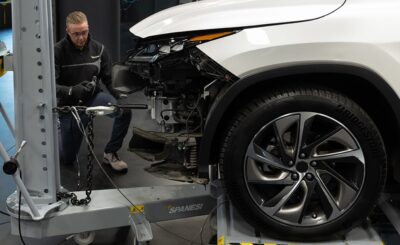Diesel fuel injectors are an important part of any diesel engine. They are responsible for delivering a precise amount of fuel to each cylinder at the right time and pressure, ensuring optimal combustion. But how do they work? What are the different types of diesel fuel injection systems available? And what are the advantages and disadvantages of each? In this blog post, we will demystify diesel fuel injectors and provide you with a comprehensive understanding of how they work and the variables involved in their operation. We will also cover the different types of diesel fuel injection systems available and their pros and cons. So, whether you’re a diesel engine enthusiast or just looking to learn more about these critical components, read on to discover everything you need to know about diesel fuel injectors.
Introduction to Diesel Fuel Injectors
Maintaining a smooth-running engine is essential for any vehicle owner, and diesel fuel injectors play a crucial role in this process. These injectors are responsible for delivering fuel into the engine’s combustion chamber, where it mixes with oxygen and ignites to create power. This system houses several components, including the injector nozzle, plunger, and delivery valve, which work together to control both the timing and amount of fuel injected into the engine. However, several factors can affect an injector’s performance, such as fuel quality, engine temperature, and air pressure. By understanding how diesel fuel injectors work and regular maintenance and cleaning procedures, owners can prevent issues and improve overall engine performance.
The Anatomy of Diesel Fuel Injectors
Diesel fuel injectors are complex components that play a vital role in the functioning of an engine. These injectors consist of various parts, including the nozzle, plunger, and spring, which work together to deliver fuel into the combustion chamber at precise intervals and in exact amounts. Fuel pressure, injection timing, and viscosity are some of the variables that can affect injector performance. It is important to regularly maintain diesel fuel injectors to ensure optimal functioning and prevent costly repairs down the line. By keeping these components clean and well-maintained, you can ensure long-lasting engine performance.
Components of Diesel Fuel Injectors
Diesel fuel injectors are complex systems made up of several components. Each component is critical in ensuring that the right amount of fuel is delivered to the engine’s combustion chamber at the correct time. The nozzle, for example, is responsible for directing the fuel spray into the combustion chamber, while the needle valve controls the amount of fuel that enters the nozzle. The spring helps regulate the movement of the needle valve and ensure consistent fuel flow, while the plunger pumps fuel from the tank to the injector. Understanding each component’s function is essential in diagnosing and fixing issues with diesel fuel injectors, making regular maintenance crucial to prevent costly repairs.
How Diesel Fuel Injectors Work
Diesel fuel injectors work by spraying fuel into the engine’s combustion chamber at extremely high pressure. This process is controlled by the engine’s electronic control unit (ECU), which monitors various sensors to determine the amount and timing of fuel injection required for optimal engine performance. Injector nozzles have tiny holes that atomize the fuel, allowing it to burn more efficiently. Regular maintenance of diesel fuel injectors is essential to prevent clogging and ensure optimal performance. Failure to maintain injectors can result in decreased fuel efficiency, reduced power output, and costly repairs. Therefore, it’s crucial to understand how diesel fuel injectors work and keep them well maintained for smooth engine operation.
Types of Diesel Fuel Injection Systems
The different types of diesel fuel injection systems can have a significant impact on engine performance, emissions, and fuel efficiency. Common rail injection is one of the most widely used systems and relies on a high-pressure fuel rail to deliver an accurately metered amount of fuel to individual injectors. This results in improved fuel efficiency, reduced emissions, and greater control over the combustion process. Unit injector systems combine the injector and pump into one unit, providing more precise control over fuel delivery. Rotary distributor pumps use a rotating disc to distribute fuel evenly to each cylinder while in-line injection pumps rely on a series of pumps and valves for optimal fuel delivery. Electronic control systems utilize advanced sensors and computer-controlled systems to optimize fuel injection for efficiency and performance. Each method has its advantages and disadvantages, depending on factors such as the engine type, application, and operating conditions.
Common Rail Injection System
The Common Rail Injection System is an advanced diesel fuel injection system used in modern engines. It offers more precise control and delivery of fuel to the engine, resulting in improved performance and reduced emissions when compared to older injection systems. However, this system requires specialized knowledge and equipment for maintenance and repair. Regular maintenance of the Common Rail Injection System can help extend the life of the engine and ensure optimal performance.
Unit Injector System
The unit injector system is a popular fuel injection system used in both commercial and passenger diesel engines. This system combines the injector and pump into one unit, simplifying the design while also providing precise fuel delivery to each cylinder. The high-pressure injection ensures complete combustion, resulting in improved fuel efficiency and reduced emissions. Additionally, this system is known for its reliability and durability, making it a preferred choice for many engine manufacturers. However, to maintain optimal performance, it’s crucial to ensure that the injectors are properly calibrated and maintained.
Single-Point Injection
Single-point injection systems, as the name suggests, use a single injector to deliver fuel to all cylinders in the engine. While these systems are less expensive and easier to maintain than other types of injection systems, they have their downsides. One significant disadvantage of single-point injection is that it can result in uneven fuel distribution among the cylinders, which can lead to decreased engine performance. These systems are typically found in older diesel engines and have largely been replaced by newer, more efficient injection systems such as the common rail system. Proper maintenance and calibration of single-point injectors can help minimize some of these issues and extend the life of the engine.
Multi-Point Injection
Multi-point injection systems are a popular choice for diesel engines due to their precision and efficiency. By using multiple injectors to deliver fuel to each cylinder, this system can improve engine performance and fuel economy. Depending on the timing of fuel delivery, multi-point injection systems can be either sequential or simultaneous. Sequential systems inject fuel in a specific order, while simultaneous systems inject fuel to all cylinders at once. This makes multi-point injection an ideal choice for larger diesel engines where precise fuel delivery is critical for optimal performance. However, it’s essential to properly maintain and calibrate these injectors to ensure peak engine efficiency and avoid potential damage or failure.
Sequential Fuel Injection
Direct Injection
Advantages and Disadvantages of Diesel Fuel Injection Systems
Diesel fuel injection systems offer numerous benefits, including higher fuel efficiency, improved engine performance, and reduced emissions. However, these advantages come at a cost. Diesel fuel injection systems are more complex than traditional carbureted systems and require sophisticated electronic controls to operate efficiently. This complexity translates to higher costs and increased maintenance requirements. Additionally, diesel fuel injectors are highly sensitive to variables such as fuel quality, temperature, and pressure. Failure to maintain proper conditions can lead to poor injector performance and decreased engine efficiency. Despite the challenges associated with diesel fuel injection systems, their advantages make them an increasingly popular choice for modern vehicles.
Frequently Asked Questions
What is the function of a diesel fuel injector?
The function of a diesel fuel injector is to deliver fuel into the combustion chamber, playing an important role in regulating the engine’s performance and emissions. Precision and accuracy are crucial for optimal engine performance. Regular maintenance and cleaning of diesel fuel injectors can help prevent costly repairs and improve fuel efficiency, making it important to take care of them.
How does a diesel fuel injector differ from a gasoline fuel injector?
Diesel fuel injectors differ from their gasoline counterparts in terms of pressure and timing. Diesel fuel injectors require higher pressure to atomize the fuel and distribute it evenly, while the timing of diesel fuel injection is critical for efficient combustion and power output. Due to these differences, diesel fuel injectors tend to be larger and more robust than gasoline injectors. These factors all contribute to the unique performance characteristics of diesel engines compared to gasoline engines.
What are some common problems that can occur with diesel fuel injectors?
Common problems that can occur with diesel fuel injectors include clogging or dirty injectors, which can lead to poor engine performance. Leaking injectors can cause excessive fuel consumption and emissions, while faulty injectors can cause misfires, rough idling, and even engine damage if left unchecked.
To prevent these issues, it is important to perform regular maintenance on your diesel fuel system, including cleaning and testing of the fuel injectors. This will help ensure optimal performance and prolong the life of your engine.
How can proper maintenance and cleaning of diesel fuel injectors improve engine performance?
Proper maintenance and cleaning of diesel fuel injectors can greatly improve your engine’s performance and fuel efficiency. Dirty or clogged injectors can cause poor engine performance, reduced power output, and increased emissions. To ensure proper maintenance, it is important to use high-quality fuel, replace filters regularly, and consider using injector cleaning products.
Cleaning the injectors can help remove carbon build-up and restore proper spray patterns for optimal fuel delivery. By taking care of your diesel fuel injectors, you can keep your engine running smoothly and efficiently for years to come.
Conclusion
In conclusion, diesel fuel injectors are a critical component of diesel engines. Understanding the process and variables involved in diesel fuel injection systems can help you make informed decisions when it comes to maintenance, repair, or replacement. With different types of diesel fuel injection systems available in the market, it’s essential to choose the one that best suits your needs and budget. While each system has its advantages and disadvantages, it ultimately depends on what you’re looking for in terms of performance, fuel efficiency, and emissions. If you want to learn more about diesel fuel injection systems, read our comprehensive guide to demystify the process and variables involved.








